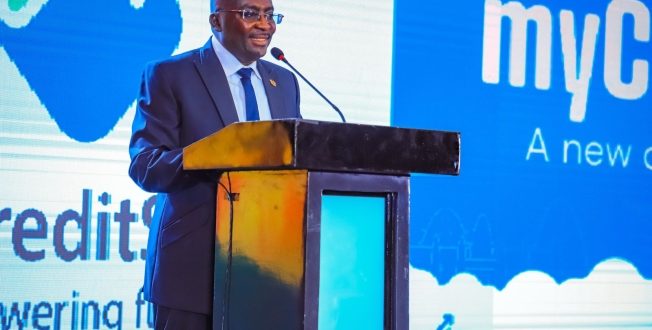Dr. Mahamudu Bawumia, the NPP’s vice president and presidential candidate, has introduced myCreditScore, a customized credit reference and scoring system for Ghanaians. This Credit Scoring System, which is supported by the Central Bank, gives Ghanaians the chance to openly show their creditworthiness, making it easier for them to obtain loans.
Through this approach, financial firms would reward people who behave well with credit and receive high ratings, allowing them to access greater credit amounts and reap the benefits of their financial responsibility.
The launch, held on Thursday in Accra, marks what Dr. Bawumia described as a “momentous occasion” for Ghana’s financial landscape. “It is a significant milestone in Ghana’s journey toward a financially inclusive and empowered society,” he stated. Dr. Bawumia emphasized that *myCreditScore* will be an essential instrument for fostering financial responsibility and trust between lenders and borrowers in Ghana’s credit economy.
The implementation of the system tackles long-standing issues in lending, where lending has been limited by high default rates and a lack of credit data.
Financial organizations can now more precisely determine a person’s creditworthiness thanks to myCreditScore, which Dr. Bawumia thinks will help reduce interest rates and expand loan availability. “The lack of a credit information system increases the risks of lending,” he noted. “A credit reporting system in Ghana would provide timely, accurate, and up-to-date information on the debt profile and repayment history of borrowers, which leads to numerous benefits.”
Recent data from CEIC Data, which shows that Ghana’s non-performing loan (NPL) rate is high—24.3% as of August 2024, with an even higher peak earlier this year—underlines the necessity of this reform. The lack of a standardized credit scoring system has increased risks for lenders and restricted borrowers’ access to financial inclusion, claims Dr. Bawumia. “It aligns Ghana’s credit ecosystem with international standards, promoting a culture of responsible borrowing,” he explained of *MyCreditScore*.
According to Dr. Bawumia, preliminary findings from a *myCreditScore* pilot program showed promise, with an NPL ratio of only 1.4 percent—a notable improvement above Ghana’s average of 20.7 percent in 2023.
The Vice President expressed optimism that this tool will reduce defaults, boost financial institutions’ confidence, and broaden credit access for individuals and businesses. “This initiative reflects a broader commitment to sustainable economic growth, where financial stability and trust in credit practices play foundational roles,” he added.
Dr. Bawumia, who was the Bank of Ghana’s deputy governor at the time, started the Credit Reporting Act in 2007, which marked the beginning of the country’s transition to a national credit score system. But after the government changed in 2009, the project came to a standstill. “The availability of credit information is crucial for the development and maintenance of an effective financial sector,” Dr. Bawumia said, acknowledging the significance of the Act.
Dr. Bawumia praised local businesspeople for leading Ghana’s digital transformation and attributed the project’s success to a collaboration between the government, the Bank of Ghana, and the private sector. The Credit Scoring project is a private sector effort that originated in Ghana. He said, “We will keep helping our private sector to promote such initiatives in the digital and other sectors.”
The vice president highlighted the broader goal of financial inclusion in her hopeful conclusion: As we work together to create a Ghana where financial inclusion is a reality, ambitions are attainable, and every Ghanaian has the opportunity to attain financial stability and prosperity, let’s go with hope and purpose. It is possible!
Source: Ghanatodayonline.com
 Ghanatodayonline.com News, Politics, Health, Education & More
Ghanatodayonline.com News, Politics, Health, Education & More




